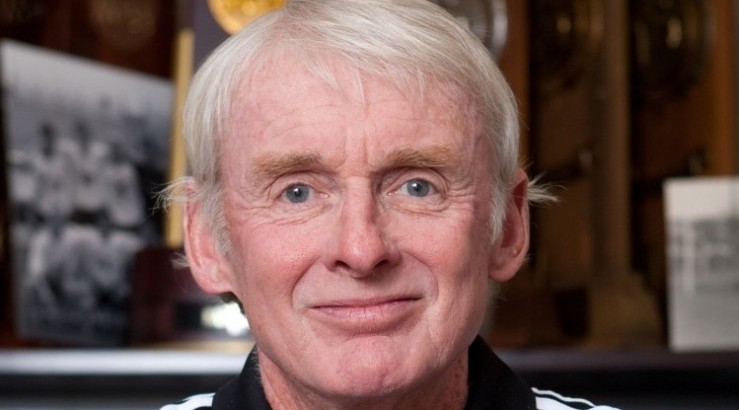Jay Martin, Legendary College Soccer Coach On Soccer
Once a basketball player, Coach Jay Martin has an amazing 80% plus record of wins with more victories on the field than any other college coach. But Martin says he doesn’t focus on winnng. What makes this maverick so special and different? Read this special One-on-One interview with legendary college soccer coach Jay Martin. If only more coaches were like Martin, the beautiful game would be even more beautiful.
On December 5, 2011, Dr. Jay Martin, long-time coach at Ohio Wesleyan University, became the winningest coach in NCAA men’s soccer history when he led the Battling Bishops to the NCAA Division III Championship against Calvin College. The victory not only brought Ohio Wesleyan their second D-III title, it became win number 608 for Martin, surpassing the previous record of 607 set by Joe Bean at Quinnipiac College, following a long tenure at Wheaton (Ill.) College.
For his achievements, Martin was named NCAA Division III Coach of the Year at the National Soccer Coaches of America Association (NSCAA) annual conference in January, 2012. It marked the third time he was received the honor. Overall Martin boasts a 608-115-49 record, all with Ohio Wesleyan.
A native of Hingham, Mass., Martin received his B.A. degree from Springfield College in 1971. He lettered in soccer and lacrosse, earning All-America laurels in the latter.
Martin, NSCAA president in 1996, is also the editor of the Association’s magazine, Soccer Journal, and of the recent book An NSCAA Guide to Soccer Coaching Excellence.
SoccerToday spoke with Martin about his accomplishments and his background with the beautiful game.
Diane Scavuzzo: Congratulations on recently reaching this amazing benchmark in College Soccer – 608 victories, more than any other college coach. How does it feel to reach that level?
Jay Martin: It is exciting to do something no one has done. I have said it shows that I am old, but it certainly is an honor and shows that we have had some great players at Ohio Wesleyan.
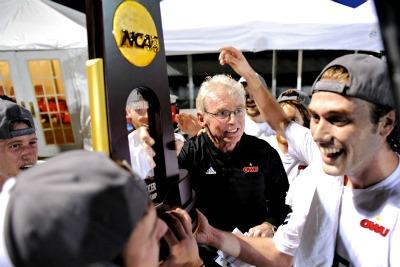
Diane Scavuzzo: When you started coaching, did you ever imagine you would achieve an 80% winning percentage and 608 Victories?
Jay Martin: You never start a career planning on winning 600 plus games. I coach the next play and the next game, not to win the big victory. Winning 80% of our games is a high percentage, but I consistently coach on what is immediately in front of us.
Soccer is a complex game. So many things have to go right to score a goal and to win a game. There are so many negative parts of the game of soccer.
We want to eliminate the past and only talk about the next game, the next play. During the game, we always talk the possibilities ahead and not the negativity of what may have happened before.
Diane Scavuzzo: Is this hard to do?
Jay Martin: Yes, it is easier said than done, but that is our focus. Being positive is important. I think it is part of the reason we have been able to win.
Another part of my coaching philosophy came from pure luck. While I was in graduate school, I had to take a class outside my major focus and chose an MBA business course on management by objectives.
Back in 1975 this was a very new concept. I realized while sitting in the classroom listening to the professor that I could apply this to an athletic program, and we have been using this philosophy ever since. It has made an impact on the guys. This idea of goal setting is very successful.
Diane Scavuzzo: When did you realize you wanted to be a coach?
Jay Martin: I always wanted to be a coach. We are all products of our youth, and I had a lot of success in sports when I was very young. My heroes and role models were coaches; my father was my first role model. Then, as I grew, I had a lot of coaches who influenced me. John Barker, who was a Springfield College graduate, influenced me the most. I went to Springfield because I wanted to be like him.
Diane Scavuzzo: What was the first sport you played?
Jay Martin: The first sport I played was basketball, and I also played lacrosse. I went to Germany after college to play basketball.
Diane Scavuzzo: Did you always want to coach soccer?
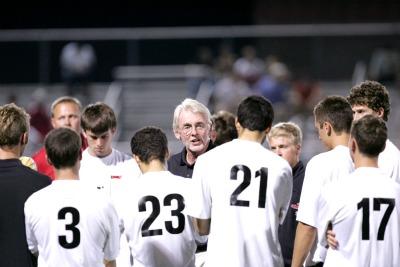
Jay Martin: No, I originally considered coaching basketball. It was in Germany that I decided I wanted to coach soccer more than I wanted to coach basketball. I went to Europe to play basketball in Munich, but I was immersed in a soccer culture over there. And I was only 20 miles from Holland. On Saturdays I would go to watch the Ajax soccer team practice.
Two years after I arrived in Germany the World Cup was held in Munich, and I was swept up in soccer. When I was traded to Düsseldorf I could see all the German northern soccer teams play, and it gave me great insight into the game of soccer.
My time in Europe changed everything and soccer became my primary focus.
Diane Scavuzzo: How old were you when you returned to the States?
Jay Martin: I was 26 years old when I came back and enrolled at Ohio State to get my PhD.
Diane Scavuzzo: How did you get your job as a coach at Ohio Wesleyan?
Jay Martin: When I was ready to complete my PhD, I did an internship at Ohio Wesleyan and I was the assistant coach for soccer and lacrosse. The head coach, Fred Myers, died in the spring of 1977 and I got the job. Actually, I was the second choice of the search committee and the President overruled them. There was a little friction about the promotion, and I remember telling my father that I was only going to stay one year. Being from the east coast I was considering returning there, but that didn’t happen.
It’s funny how all this has happened since. Now I am getting all of these honors, all these interviews, and the irony is that I haven’t done anything differently for the past 35 years. All of a sudden I am receiving all this attention.
Diane Scavuzzo: How would you describe your style of soccer?
Jay Martin: The style is German or Dutch. In the German style of soccer, we like to keep the ball on the floor, keep possession and attack.
Two of the most important players in our style are the outside backs. We attack all the time with the outside backs; it is a continental type of European soccer.
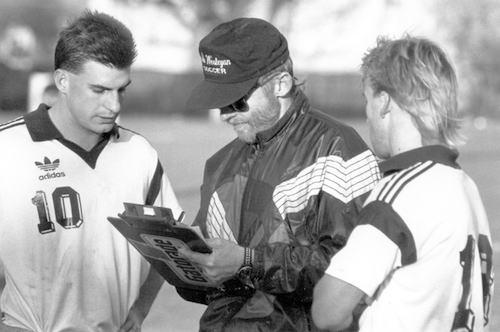
Diane Scavuzzo: What is your idea of the perfect game?
Jay Martin: The final score would be 10-9, a really close game with both teams going to goal a lot.
You would see two very good teams attacking each other, not playing the conservative defense type of soccer that we often see at the World Cup.
I like a real attacking game – all the things I think soccer has been criticized for and that I have loved the past 30 years!
Diane Scavuzzo: What do you consider your greatest achievement so far?
Jay Martin: I would say marrying my wife of 30 years. She has probably seen more soccer games than anyone else at Wesleyan.
Another great accomplishment for me personally is that we have only had five young soccer players who have not graduated.
I remember the late, great Joe Paterno was once asked by a reporter, “Is this the best team you have had?” Joe answered, “I will not know for twenty years.” The reporter didn’t understand and was stunned by Paterno’s response. I do understand.
While winning a specific soccer match is important, there are things that coaches do that are more important than winning 600 plus games.
Diane Scavuzzo: What is more important?
Jay Martin: Having an influence and impact on the players. Creating an environment where the players can grow and be nurtured. I am a full professor here, so my role is to lead and inspire students, not to win games.
Diane Scavuzzo: And yet you have won more college games than any other college coach…
Jay Martin: Thank you, I focus on the players and the game. Not winning. Winning or losing is usually a big part of a coach’s evaluation, but it is not at Ohio Wesleyan. I don’t care what they say, most coaches are evaluated on wining and losing and it will affect the decisions they make.
The way I look at soccer is different than a coach who approaches a soccer game at a D-I college.
I don’t think the job of a college is to prepare a person for pro sports.
Diane Scavuzzo: How does that affect the way the game is played here?
Jay Martin: I think the win at all cost mentality is a huge problem in our country.
Parents often say this country is built on competition when actually this country is built on cooperation.
In youth soccer for instance, kids go back after their first soccer practice because it was fun. Why take that away from them? This doesn’t happen in Europe. Here playing and having fun are replaced by the pressure to win.
Great basketball players like Larry Bird and Magic Johnson played the game because they loved it, regardless of the money.
Bird and Johnson would play as hard in a deserted gym as they would in front of the TV cameras and millions of viewers.
Tiger Woods loves and respects the game of golf so much. He is out there having fun and trying to win, and the money just happens.
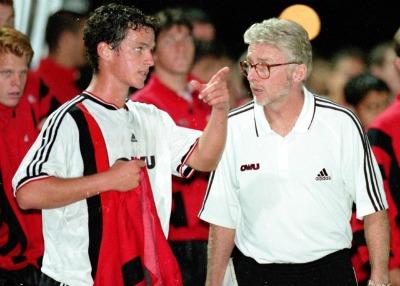
Diane Scavuzzo: What is your greatest challenge as coach?
Jay Martin: I would say getting 25 players on the same page, especially in soccer where you do not have set plays like you do in football and basketball.
Kids are very controlled in college basketball; soccer is a free-flowing, creative game and getting 25 guys on the same page can be difficult. The team can be awful even with great players.
Diane Scavuzzo: What do you like best about being a coach?
Jay Martin: I like the relationship with the players; some of my best friends are guys that I coached a long time ago. It is such an intense, emotional relationship when you are coaching. It gives me a great deal of satisfaction, but no one has named one of their kids after me, yet.
Diane Scavuzzo: What does it take to be a good coach?
Jay Martin: Good coaches realize their strengths and weakness and surround themselves with people who can help them.
You just have to keep your ego in check.
Diane Scavuzzo: Who is your favorite coach?
Jay Martin: I like Arsenal’s coach Arsene Wenger. His focus is on the process. He sticks to the way Arsenal wants to play, which is positive, attacking soccer.
Diane Scavuzzo: Who is your favorite professional soccer team?
Jay Martin: Bayern Munich in the days of Franz Beckenbauer. I used to watch them train when I was in Germany.

